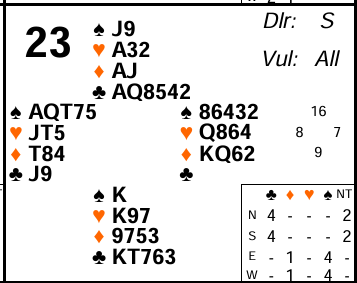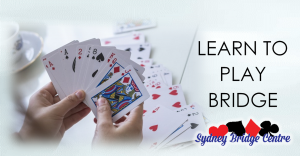City and Canada Bay – Thursday Morning 13th March 2025.

The auction on board 23 last week is likely to have a dramatic effect on the end result. East West can actually make 4♠ despite only having 15 points between them – the question is whether they have any chance of bidding it. Meanwhile North South have a large club fit and 25 points between them but can’t actually make any game.
The most likely start to the auction is P P 1♣ P. Everything then hinges on how South chooses to respond. The most likely thing he is going to want to do on this hand is raise clubs (although some pairs now have a 1♣ opening only guaranteeing 2 clubs). Raising minor suits isn’t an area that is discussed that much when you first start playing bridge as all the focus is on majors and no-trumps. But every so often a hand like South’s comes along. You could simply play the same as over majors – i.e. a raise to 2 is about 6-9 points, a raise to 3 is invitational with about 10-12, etc. But there are some different factors involved. You will want to explore no-trumps as a possibility because you only need 9 tricks to make game as opposed to 11 in a minor. Also there’s more of a risk that the opponents can outbid you in the majors (after all they will probably hold majors if you don’t).
So a common approach these days is to play “inverted minors”. There are lots of variations around this but the basic premise is that you invert the meaning of raises so you play a raise to 2♣ as STRONG (at least 10+) and a jump to 3♣ as WEAK. See advanced section for more discussions.
There are a few possibilities for South. He could simply avoid raising clubs at all to start with and respond 1♦. He might also consider 1NT – the diamonds are hardly a suit you want to mention(!) and he has values in both majors. Failing that he will want to raise clubs. This hand is pretty good for a minimum raise with a singleton and 5 card support – although the singleton ♠K downgrades it a bit as that could be useless. But it’s also not really a strong raise worth 10+. What he really wants is some sort of in-between bid. This opens up other possibilities. It’s possible to play a jump in the other minor as a limited raise (1♣-2♦ or 1♦-3♣). Those bids aren’t very useful as strong or pre-empts so they fit quite well as something like this.
There is another important factor South should consider when deciding what to respond. He knows the opponents are odds-on to have a spade fit (his partner didn’t open 1♠ so is very unlikely to have 5 – hence the opponents have at least 8 between them). So if he chooses a low level bid like 1♦ see what might happen? West will now have a chance to overcall 1♠. North might well jump to 3♣ next but now East will surely come to life. Knowing his partner has at least 5 spades, his hand now becomes enormous with 5 card support, a void, and honours in both the other suits. He absolutely should raise to 4♠ – remember shape beats points all the time in bridge!
See what an enormous difference it makes if South chooses to respond 1NT or higher. Now West would have to bid 2♠ and that’s very dangerous with a hand that’s balanced. He will almost certainly pass and now East West probably won’t get into the auction at all! These days a 1 level overcall doesn’t show very much and if you let the opponents get into the auction cheaply it can be very costly.
If East West do bid 4♠ it’s entirely possible North South will bid onto 5♣ but that at least means East West will get a plus score as 5♣ can’t avoid losing a spade, heart and diamond. Meanwhile 4♠ will make – scoring 5 trumps, 2 club ruffs in dummy, and eventually 2 diamonds and 1 heart. Declarer just needs to lead towards the ♦KQxx. Yes you might say that’s lucky (North South might have had a heart ruff available). True – but it demonstrates the power of a big fit and a shapely hand. Besides, declarer shouldn’t be too unhappy if North South do have a heart ruff. Can you see why? See advanced section for the answer.
I said that North South can’t make game. That’s true in theory – but in practice if South chooses to respond 1NT and North raises to game it’s very likely to make. Would you lead the ♠A from West? No, neither would I. But that’s the only lead to beat 3NT – anything else and declarer has 6 clubs, ♥AK and ♦A. In fact a low spade lead from West would mean at least 10 tricks!
There is a further variation – North might try a slightly off-shape 1NT opening. See advanced section for more on that. Of course this time that’s not going to work out well – now he is declarer in no-trumps and as long as East leads a spade that should quickly lead to the defence taking 5 spade tricks.
Key points to note
Responding to minors is not the same as majors. You tend to still want to look for no-trumps and also want to try and stop the opponents finding majors.
Inverted minors are popular – where a sequence like 1♣ – 2♣ is strong and 1♣ – 3♣ is weak.
Being able to overcall at the 1 level is very valuable – it might be the only chance your side has to get into the auction!
When deciding on your bids, consider if you are giving the opponents the chance to get in cheaply. If you are, perhaps it’s better to choose something else!
Shape beats points every time! On this hand the pair with only 15 points are the ones who make game!
More advanced
Traditional inverted minors simply inverted 2♣ and 3♣ so that 2♣ was 10+ and 3♣ was 6-9. However, these days it’s more common (and better) to play a jump to 3♣ as weak and pre-emptive (to try and stop the opponents finding their major suit) and use another bid (e.g. a jump in the other minor) for a limit raise. Using these bids this way is sometimes referred to as “criss cross raises”. You can also respond 1NT with 5-9. My regular partner and I play the jump in the other minor as about 8-11 and we actually play the inverted raise as game forcing (12+). So we would respond 2♦ on this South hand. That’s enough to keep West out of the auction.
How do you continue after an inverted minor raise? Again there are lots of possible schemes and interested readers can, I’m sure, find a lot of information on the internet. But a simple approach is to just continue relatively naturally – no-trumps are balanced, bids of suits are natural’ish (typically showing values there – opener might have 4 of course but a hand that’s made an inverted minor raise has already denied holding a major) – the initial aim being to see if 3NT is a viable spot. If it isn’t you can play 5 minor or even explore for 6 minor. That’s another advantage of inverted minors – it gives you more space with strong hands to potentially explore slam.
Something to discuss is do inverted minors still apply after intervention? For example over 1♣ (1♥)? Or what about over 1♣ (X) ? In general after an overcall inverted minors should not apply. A jump to 3♣ can still be pre-emptive but 2♣ should just be competitive. With strong support for clubs you can now make a cue raise of 2♥ instead. After a double, there’s more of a case for inverted minors to still apply. You want to pre-empt the responder of the double, and you don’t have a cue raise available yourself. It’s a fairly good principle in competitive bidding to just ignore doubles – and play what you would have done anyway.
4♠ makes for East West because the defence can only score 2 hearts and 1 diamond. The hearts are 3-3 so they can’t take a heart ruff. If they could then 4♠ would go off. But the reason declarer shouldn’t mind that is because then 5♣ would be making! It’s the fact that hearts are 3-3 which gives North South a loser in the suit. If they are 4-2 then they no longer have a heart loser and will just lose 1 spade and 1 diamond. So now 4♠ -1 is a fine score for East West compared to the -600 they might have had!
I mentioned that North might consider a slightly off shape 1NT opening. Even though it doesn’t work here there’s a lot to be said for it – he is semi-balanced, in the right point range, has values in all suits, and has a potential source of tricks. What’s more it also means East won’t be able to make a 1 level overcall (swap the East West hands over and now it would be very tempting for East to overcall 1♠ over a 1♣ opening – not only does it pinpoint a good lead, it takes a lot of space and in fact here would lead to them unexpectedly making game!)
Julian Foster (many times NSW representative) ♣♦♥♠




